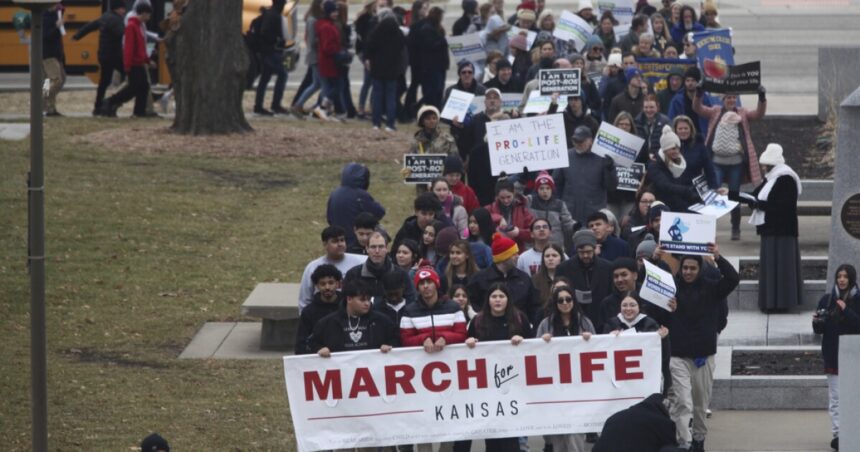Kansas’ highest court emphatically upheld on Friday that the state constitution safeguards abortion access, invalidating a prohibition on a common second-trimester procedure and laws imposing stricter regulations on abortion providers than other healthcare providers.
The two 5-1 rulings indicate that additional restrictions, even those existing for decades, may not hold up against legal challenges. The dissenting justice, considered the most conservative on the court, cautioned that Kansas is moving towards “a legal environment of unrestricted access to abortion.”
“This is a significant triumph for the health, safety, and dignity of individuals in Kansas and the wider Midwest region, where millions have been deprived of abortion access,” stated Nancy Northup, president and CEO of the Center for Reproductive Rights, which represented the abortion providers contesting the two laws.
The rulings came nearly two years after a decisive August 2022 statewide vote reaffirmed abortion rights, the first such vote following the U.S. Supreme Court’s Dobbs decision in June 2022 that permitted states to outlaw abortion entirely. Kansas voters rejected a proposed amendment to the state constitution endorsed by the Republican-controlled Legislature that would have declared no right to abortion in the document.
Related story: New anti-abortion laws go into effect in Kansas despite governor’s veto
Republican Attorney General Kris Kobach’s office contended that the 2022 vote was irrelevant in determining the validity of the two laws. However, Justice Evelyn Wilson, one of the justices appointed to the court after its landmark 2019 ruling, stated that she might have dissented then, but “The people spoke with their votes.”
“The results were accepted by the people, and Kansas showed the world how things are done in a successful democracy,” expressed Wilson, an appointee of Democratic Gov. Laura Kelly, a staunch advocate for abortion rights.
Neither of the laws invalidated by the court had been enforced due to the lawsuits filed by abortion providers against them.
Additional lawsuits in lower state courts are challenging restrictions on medication abortions, a prohibition on doctors using teleconferences to consult with patients, requirements for what doctors must disclose to patients before an abortion, and a mandate for patients to wait 24 hours after receiving information about terminating their pregnancies.
Friday’s judgments will have implications far beyond Kansas as the state has become a destination for thousands of patients from states where abortion is virtually prohibited, particularly Oklahoma and Texas. The Guttmacher Institute, a proponent of abortion rights, projected last month that about 20,000 abortions were performed in Kansas in 2023, a 152% increase from 2020.
Related story: In wake of Supreme Court ruling, Biden administration tells doctors to provide emergency abortions
Opponents of abortion argued before the August 2022 vote that maintaining the state constitution unchanged would jeopardize longstanding restrictions implemented under previous Republican governors. Kansas witnessed a surge of new restrictions during GOP Gov. Sam Brownback’s tenure from 2011 to 2018.
“It’s painful to say, ‘We told you so,’ to the many Kansans who were misled by the abortion industry’s assurances that it would still be ‘heavily regulated’ in our state if voters rejected the 2022 amendment,” remarked Danielle Underwood, a spokesperson for Kansans for Life, the state’s foremost anti-abortion organization.
Justice K.J. Wall, an appointee of Kelly, abstained from both rulings on Friday, while Justice Caleb Stegall dissented. Stegall was appointed by Brownback.
In his dissent in the clinic regulations case, Stegall argued that the majority’s actions would undermine the court’s credibility “for years to come.” He contended that the majority’s statements about bodily autonomy could impact a broad array of health and safety regulations beyond abortion, including licensing requirements for barbers.
“Certainly the government does not have a compelling interest in who trims my beard?” Stegall questioned. “Let the lawsuits begin in this new target-rich environment. The majority has — perhaps unknowingly — placed the entire administrative state under strict scrutiny.”
Justice Melissa Standridge, also appointed by Kelly and the justice writing the majority opinion in the clinic regulations case, criticized Stegall’s remarks as “inappropriate and demeaning to women facing decisions between childbirth and abortion.”
Kansas does not prohibit most abortions until the 22nd week of pregnancy, but minors are required to obtain written consent from their parents or a guardian. Other requirements, such as the 24-hour waiting period and provider disclosures to patients, have been put on hold. A lower court is reviewing a challenge to these requirements by providers.
The health and safety regulations aimed specifically at abortion providers were enacted in 2011. Advocates argued that they would safeguard women’s health, although there was no evidence at the time that similar rules elsewhere had led to improved health outcomes. Providers contended that the real objective was to drive them out of business.
Standridge emphasized in the majority opinion on the clinic regulations that not only was there no proof that the rules would enhance patient health, but in some cases, it “directly contradicts” that claim.
She noted that even the state’s expert in the case acknowledged that “existing abortion care is extremely safe” and comparable to care not subject to the regulations.
The other law invalidated by the court would have prohibited a specific type of dilation and evacuation, also known as D&E. It was the first such state ban when it was enacted in 2015.
According to statistics from the state health department, about 600 D&E procedures were performed in Kansas in 2022, constituting 5% of the state’s total abortions. Approximately 88% of the state’s abortions occurred in the first trimester. Data for 2023 has not yet been released by the state.
The ban on the procedure would have compelled providers to resort to alternative methods that the Center for Reproductive Rights deemed riskier for patients and more expensive.
Justice Eric Rosen, an appointee of former Democratic Gov. Kathleen Sebelius, noted in the majority opinion on the ban that evidence in lower courts indicated it would force patients to undergo alternative procedures “that are rarely used, are untested, and are sometimes more perilous or unfeasible.”





